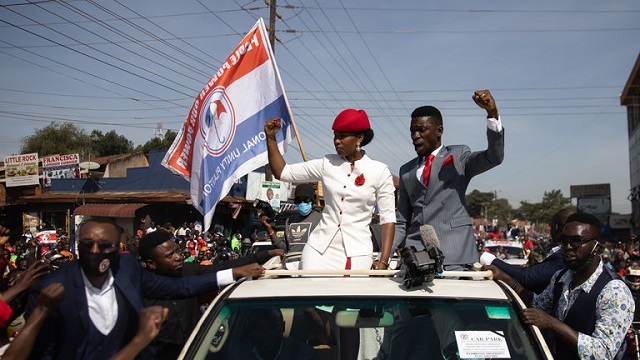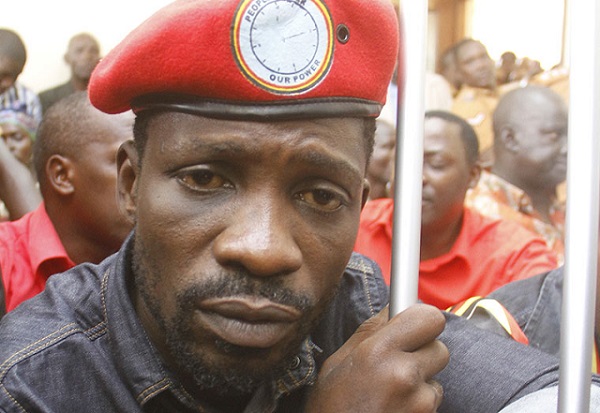
The film-makers worked with almost 4,000 hours of raw footage which took two years to edit
ARTS | JULIA CAIN | Bobi Wine is a pop star in Uganda who uses his music for political protest and social activism. Born Robert Kyagulanyi, he became a member of parliament (MP) in 2017 and has gone on to lead a popular opposition movement in the face of state violence and repression. His political journey is now the subject of a documentary.
Bobi Wine: The People’s President is one of the five films nominated for Best Documentary Feature Film at the 2024 Oscars in the US.
All five are “international” (neither US-focused nor US-directed) and two are African – Bobi Wine and Four Daughters from Tunisia. For me as a film academic with a specific interest in African documentary, these are exciting times. There is an incredible richness in content, process and form that is being demonstrated by African directors telling African stories.
And this is true of Bobi Wine: The People’s President. Filmed over five years, the documentary captures the real-time unfolding of tumultuous historical events through the personal journey of the singer and his family with great urgency, intimacy and care. It chooses a side and commits deeply to this political choice and it makes for gripping viewing.
4,000 hours of footage
A Uganda/UK/US co-production, Bobi Wine: The People’s President offers global audiences an emotional roller coaster of a documentary. The contemporary political struggle for democracy in Uganda is embodied through Bobi Wine and his battle against his nemesis, the autocratic President Yoweri Museveni, who has been in power in Uganda since 1986.
Ugandan film-maker Moses Bwayo and Ugandan-born Christopher Sharp are the co-directors. The film-makers worked with almost 4,000 hours of raw footage which took two years to edit. Bwayo eventually moved into Bobi Wine’s family home, as the political situation grew increasingly precarious.
The result is a film that captures both an inspirational leader and a country in deep political crisis. It does this through capturing intimate family moments in the home, sweeping scenes of mass gatherings on the streets, and insider views of historical events as they unfold.
What it’s about
The film begins with an introduction to Bobi Wine, who grew up “in the ghetto” of Kampala. His early life and love story with his wife Barbara Kyagulanyi is set out with appealing interviews and a trove of archive material. His upbeat and catchy music is incorporated from the start and illustrates the values he had already started to articulate as he shifted from pure pop to edutainment by 2014.
Shooting for the documentary began in 2017, after his overwhelming by-election win to become an MP in Uganda’s parliament. After meeting Bobi Wine and his family, the film shifts gears into a mainly observational style, following the dramatic ups and downs of personal and national events as they unfold.

The visible physical transformation of the man from the beginning of the film to the end is deeply affecting. In the early days, we see him as an idealistic newly elected MP – dancing and singing to joyous, celebratory masses from atop his car roof. He embodies Ugandans’ hope for change and a return to democracy, and is seemingly unstoppable.
However, Museveni is determined to hold on to the reins of power by any means. He engineers a change to the constitution in 2019 to enable him to run for a fifth presidential term in 2021. He also uses state police and military to perpetrate violence and torture, initially on political opponents but increasingly on the general population as well.
The political stakes thus rose very quickly following Bobi Wine’s election and his very vocal criticism of Museveni and his government. The film-makers suddenly found themselves following a much bigger story than they had anticipated. Their access to their subject and his family rapidly increased as it became clear that the constant camera documenting their lives had become a form of protection for them.
Both the commitment to the cause of democracy and the risks were shared by the film’s Ugandan participants in front of and behind the camera. Both Bobi Wine and film-maker Bwayo experienced arrest, imprisonment and physical violence during the making of this film.
Hoping to inspire change
With the thousands of hours of footage, including extensive documentation of state violence and torture, the question the film-makers faced was how to tell the big story of Uganda and the fight for democracy. Both the people behind and in front of the camera wished to raise international awareness of the dire state of Museveni’s reign and the descent into dictatorship. But they also wanted to inspire hope for change.
They decided to minimise graphic violence in order to widen the potential reach of the film and to focus on the personal story of the singer-turned-politician. The weight of state violence, however, still resonates throughout the film.
In an extended scene in parliament, we see Bobi Wine make an impassioned plea for the values of the constitution and the future of the country – and then watch as MP after MP declares their vote to change the constitution to enable Museveni’s fifth term. Later that night, Bobi Wine films himself with an iPhone camera set up for him at home. Appearing vulnerable and defeated, he declares: There is no democracy in Uganda.
Seven months later, he is arrested for the first time and taken to a military prison, where he is beaten and tortured.
The drama and emotion of this real-life tale inspires deep respect for the resilience and bravery of the Ugandan opposition leaders and the everyday people showing up despite the enormous risks – all hopeful for a better future. It also explicitly asks international audiences from the west to hold their own governments to account – and to insist that support to the Ugandan government be tied to upholding human rights and democratic principles.
*****
Julia Cain is lecturer in Screen Production and Film Theory & Practice, University of Cape Town
Source: The Conversation
 The Independent Uganda: You get the Truth we Pay the Price
The Independent Uganda: You get the Truth we Pay the Price


